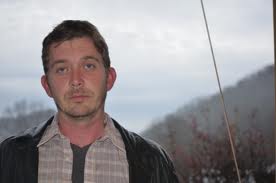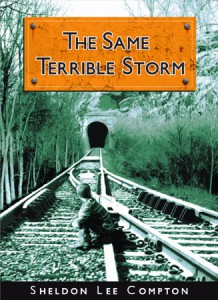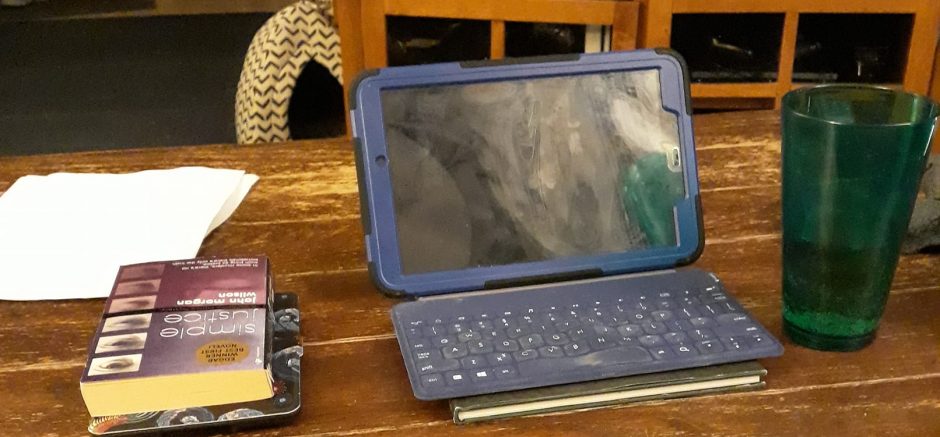 Sheldon Lee Compton is the author of the collection, The Same Terrible Storm, recently nominated for the Thomas and Lillie D. Chaffin Award. His work has been published widely and been four times nominated for the Pushcart Prize, and was a finalist in 2012 for the Still Fiction Award as well as a finalist for the Gertrude Stein Award in Fiction the following year. He is also Editor in Chief of Foxhead Books, and survives in Eastern Kentucky.
Sheldon Lee Compton is the author of the collection, The Same Terrible Storm, recently nominated for the Thomas and Lillie D. Chaffin Award. His work has been published widely and been four times nominated for the Pushcart Prize, and was a finalist in 2012 for the Still Fiction Award as well as a finalist for the Gertrude Stein Award in Fiction the following year. He is also Editor in Chief of Foxhead Books, and survives in Eastern Kentucky.
I know you work in genre fiction as well as literary. Is it too limiting to be defined as an Appalachian writer?
I’ve written a lot of short-short stories, flash, prose poetry and the like, and a lot of that as historical fiction, for sure, but most of my work is set in East Kentucky. In fact, both my collection and the novel I’m working on now, and I imagine anything I write most likely, will be set in East Kentucky. But I’ve never made the deliberate decision in that direction. It’s my natural position as a writer. I think there is a richly deep well of stories here and people absolutely swelled with personality and character. I’m more than lucky to be from and live in a region where that’s the case. That said, I am occasionally curious why my work is at times referred to as Appalachian literature and then other times Southern literature. Then, more often as not, simply literature. But that’s where it ends for me, I think. The labels, after all, will create no change in the way I approach the stories I hope to tell. That said, labels can be limiting and I wouldn’t welcome anything, label or otherwise, that made any attempt to place blinders on my work.
Who are your role models in writing?
2A. I’m a generation removed, I think, in this respect. I look to writers in whose work I find honesty rather than forward momentum in respect to form or theory or other concerns. And I say removed because I don’t spend time studying passages from Fitzgerald, Faulkner, Joyce or anyone else many may believe need to be looked at as role models, especially in the beginning of one’s own career as a writer. My generation, though writing beautifully and wild and in new voices and looking to works from the likes of Wallace and Eggers for direction after hitting the big names first, are doing fine. But I’m in it for the story, with a healthy obsession for language. My role models developed in this way and I landed on two writers I will always point to – a perfect marriage for me – in Michael Ondaatje and Breece Pancake. And I can go so far as to narrow Ondaatje to a single work, Coming Through Slaughter, just as, sadly, Pancake has only the one. But then Pancake gave us more honesty in that one and only collection than I’ve seen anywhere else within anything I’ve read. So I have two books as role models. I like books that way…role models, friends, lovers, teachers. Show me what other thing in the world can be so versatile. Oh, and aside from this, Emily Dickinson is my first and foremost role model, my favorite writer. The only writer of renown who wrote not for publication, but for herself. No one can beat that today, and probably never will with the resulting success and admiration.
Your experience with Foxhead must have been good, as you’re now editing for them. Tell me how you ended up publishing and editing there.
I have a wonderful relationship with Foxhead, yes. And, honestly, how could I not? Stephen Marlowe is a force, and Foxhead had a clear and distinct vision for where they wanted to be now and in the future. They did well by me when I was an author in their stable and now that I’ve been made Editor in Chief, I’m eager to do the same for writers coming up. My collection, The Same Terrible Storm, was published by Foxhead after a few correspondences between myself and Stephen Marlowe, the Fox. And I can say that from the moment on I knew that Steve was interested in truly bringing good work to people. He’s a giant who hasn’t been spotted yet through the trees. Or maybe he has, now. I certainly hope so.
Since the first of the year I’ve been working as closely as I can with authors coming in. It’s great. There is so much flexibility I’m able to give a great amount of attention to my own work while being able to have the chance to see work from others, talk with them – by phone when possible, as my grandfather instilled in me the sense that true business in done face to face. Well, face to face is difficult, but a phone call is one step removed from emails back and forth and no sense of the person you’re taking to in the meantime.
 I like the way the shorter stories were interspersed in your book. Did you have a plan in mind for the order of stories, or is it more or less random?
I like the way the shorter stories were interspersed in your book. Did you have a plan in mind for the order of stories, or is it more or less random?
Other than trying to vary the longer stories and the shorter ones in the hope it would be pleasing for the reader, I didn’t put any more thought into it than getting the stories in that I thought were best.
In the story ‘First Timers’, you write of some young folks that maybe aren’t ready to take those first steps into true adulthood, by way of a hog-killing gone slightly awry. The ending is true greatness. How did you come to that image?
First off, thanks very much. I had this final scene in my head before I started writing the story. I knew those guys were going to be under the tree sort of laughing at these boys, but I didn’t know until I got there that there would be the “pound for pound” moment that draws the comparison between the boys and the hog. It was one of those instances for me as a storyteller where it seemed to come naturally, and I simply wrote it down before I lost it. I suppose somewhere in the back of my mind I had the boys and the hog all tied up together and that last scene was my brain’s way of letting me know that. It was a cool moment. I like those times when the story takes over, and I especially like it when it takes over for the ending or beginning.
‘Purpose’ is an excellent leadoff story. I noticed Brown Bottle, from your novel, makes an appearance here. Do you publish many outtakes from it, or is this kind of anomaly?
Since beginning Brown Bottle I have published a couple chapters here and there, yourself being one who was kind enough to include a chapter at Fried Chicken and Coffee. Many chapters can stand alone as stories. That said, “Purpose” was the only chapter published before I started the novel. That sounds weird as I answer, but I suppose it makes more sense when I explain that “Purpose” was the story I knew I would revisit and want to explore in a longer work. Brown is a character close to my heart, my favorite creation. The story works as the first chapter to the novel.
Where did the cover image come from?
What a great question! So glad you asked, Rusty. In the town where I grew up – Virgie, Kentucky – there’s a train tunnel very similar to the one on the cover. It was like a carnival attraction for myself and others growing up in Virgie. It is one of the emotional hubs of my childhood in terms of memories and a grounding of place. I knew I wanted that tunnel on the cover. The boy, graphic artist’s Logan Rogers’ son, was included to foreshadow the story “Go Get Your Honor”. This story concludes with Man Dodge sitting on the tracks and waiting for a train to come. The image was a powerful one for me, this young boy trying to become tougher, more courageous, by waiting as long as possible before getting up from the tracks. I was greatly appreciative that Steve and company at Foxhead gave me so much creative input on the cover.
How does the guitar function in your creative life?
Ah, yes. The guitar plays a huge role, actually. I’ve played since I was five so it’s something that enters into many aspects of my life. In general, it’s most often a sounding board for me when I find myself stuck on a story, something creative I can pick up and continue to keep the wheels moving. However, I’ve also prominently placed the guitar within my work, as well. Music in general, really. There’s something about music that offers a reflection of storytelling for me. I first saw this done perfectly in Coming Through Slaughter, and, little by little, allowed myself to incorporate music into my own work. And there’s the practical part of it all, too. If I couldn’t pick up the guitar and play when stuck, I might have to change my answer about writer’s block. I like being able to say it doesn’t exist.
Can you give us advance info on any of Foxhead’s upcoming titles?
We have several books in the works right now. We recently accepted a book from Michael Wayne Hampton that I’m excited about called The Geography of Love. It’s Mike’s story collection, and it’s solid. He submitted it to Foxhead before I was named editor and I was happy to see it when I arrived. I like Mike’s work and have since grad school. It’s strange how things work out. One minute you’re sitting in the lobby of the Brown Hotel in Louisville talking about craft and the next you’re embarking on the editor/writer relationship. As for other projects, there’s plenty brewing. But the thing I’m most excited about now is the possibility that we will be adding poetry to the imprint, and bringing in a poetry editor to head that up. Good things ahead and full of steam. It’s all pretty exciting, to be honest.
What new projects do you have in mind? What’s your current obsession?
After working for nearly the past two years on my novel, I’ve finally decided to set it aside for a time. I’m teaching more this semester than before so that requires more of my attention, and there’s the added benefit of giving those pages time to simmer for a bit. I hope when I approach it again, I’ll see things to work on I might have overlooked before taking the break. I’ve also been enjoying a renewed love of reading lately. For too long I had read only as a storyteller, picking apart sentences, paragraphs, looking for story arcs, studying craft in general. About a month back, I picked up a Cormac McCarthy novel I’d been wanting to read and just decided I was going to read for enjoyment. And then there it was, the love of reading I hadn’t even realized was suppressed until then. Don’t get me wrong, I love to study the craft of writing, but the two things are different. My current obsession is my old obsession reborn – the enjoyment of the written word.





